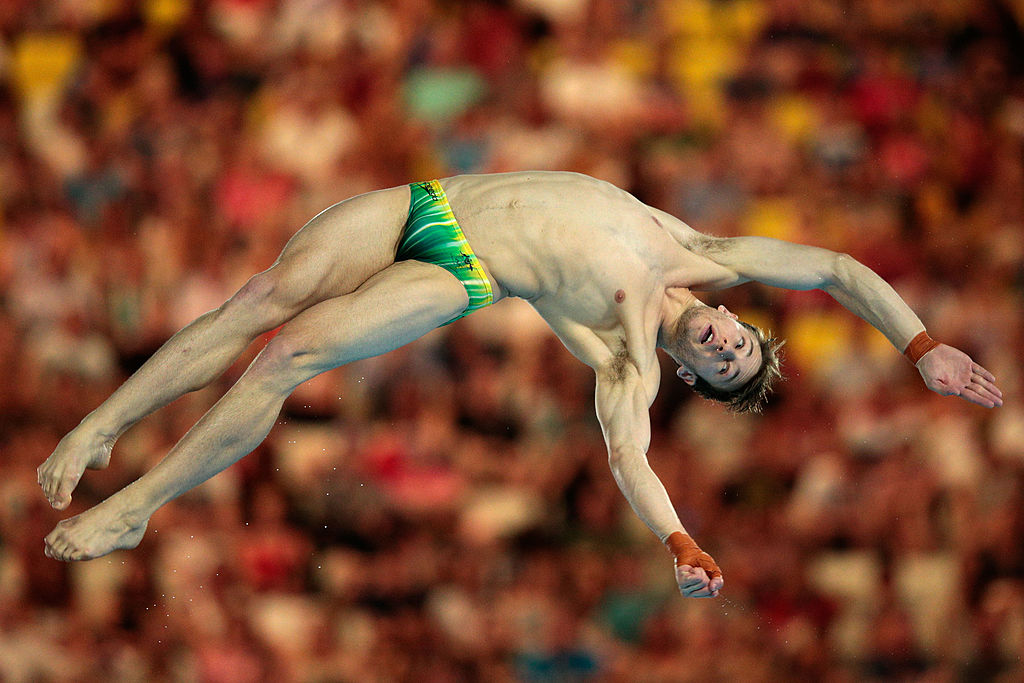Olympic champion Matthew Mitcham on chemsex and overcoming addiction: ‘There was a lot of fear’

Diver Matthew Mitcham went to rehab after winning gold at the 2008 Beijing Olympics. (Getty/Supplied)
In 2008, diver Matthew Mitcham won gold at the Beijng Olympics – and just a few short years later, he checked in to rehab.
Matthew’s journey with addiction didn’t start after the Olympics. It had begun much earlier, when he was a teenager growing up in Australia.
Between the ages of 14 and 18, he struggled with debilitating depression. He turned to alcohol and drugs in a desperate attempt to stay afloat.
“I could see that my drug use already was a bit problematic at that stage,” he tells PinkNews.
Aged 18, Matthew thought he had given up diving for good, and he says his drug use started to spin out of control.
When he was presented with the opportunity to start diving again, he quickly scrubbed drugs and alcohol from his system so he could compete.
“I felt like it was my ticket to being special – like it was my only option,” he explains.

Winning gold at the Olympics gave him a high he could never have experienced on drugs – but once he returned home, the same old problems started to resurface.
“All that stuff came back with vengeance after Beijing. I shamed myself a lot for having depression and for feeling the way I felt because I felt like it was unjustified.
“I was so ashamed – that really prevented me from getting help, so I went back to using the same coping mechanisms that I’d used before to change the way I felt, which was drugs.”
Because Matthew was still pursuing his diving career, he had to detox every time a competition was on the horizon.
“That process was just horrible,” he recalls.
“Every single time, because it was so awful, I would just promise myself with every single cell in my body that I would not use drugs again after that competition. And every single time I just couldn’t keep that promise to myself, because being inside my own head was so unbearable.

“I just felt so badly about myself – and so I guess the drugs helped me to switch my mind off, to get through the day.”
Matthew Mitcham went to rehab out of ‘desperation’
After a six month stint of trying and failing to give up drugs and alcohol, Matthew Mitcham knew he had to get help.
“There’s something quite soul destroying about making a promise to yourself with absolute conviction and not being able to keep it.
“It was just tearing my self-esteem in half every single time until I literally had no self-esteem left.
“I got to a point of absolute desperation where I literally could not do it by myself. It was a last resort, really, to go to rehab.”
As an athlete, getting help wasn’t easy – he was terrified the world would find out about his struggle with addiction.
“There was a lot of fear for me – being in the public eye, being recognisable, being in sport – there’s a huge taboo with drugs and sport.”

Even so, Matthew knew he needed help. He checked in to rehab and dedicated all his time and energy into figuring out why he kept going back to drugs and alcohol.
“When it comes to the mind, I don’t know best, so I had to reach out to people who knew better than me,” he explains.
“There was a lot of fear that prevented me from doing it but ultimately it was the best decision I ever made.”
In rehab, Matthew explored the root causes of his addiction – and he quickly discovered it all stemmed from the depression he had been grappling with since he was 14.
“The drinking and the drugging were a symptom of depression rather than the other way around.
“For me it’s all about self-esteem. I used to have such poor self-esteem that I was completely dependent on all of these external sources to make myself feel better.”
He continues: “Using drink and drugs is a really powerful way to change the way you feel.

“Going to rehab, I learned lots of other tools to change the way I feel – much more effective ways to change the way I feel – that don’t have these added consequences.”
Today, Matthew is seven years sober – and life couldn’t be better. In 2020, he married his partner, Luke Rutherford, and they live together in the UK.
Matthew knows how pervasive addiction is among queer people, which is why he’s volunteering with Controlling Chemsex, a charity that provides support to people who use drugs to enhance sex.
He considers himself lucky that he never tried chemsex himself, but he knows from speaking to others how much it affects people’s lives.
“Every single week I will hear stories of boys who are scared of having sex because it’s so triggering for them.
“I’m very passionate about helping people who do have these issues because it is insidious.
“People should be able to have sex without the shackles of having to be high,” he says.

